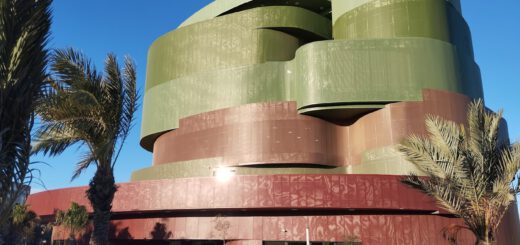PhD fellowship INPhINIT 2023
Optimized rhizosphere microbial communities for enhanced plant productivity and stress resilience
Host Organization: CBGP (UPM-INIA) – Centro de Biotecnología y Genómica de Plantas
Doctoral INPhINIT Fellowships Programme – Incoming. Call for applications 2023 (LINK)
The Centro de Biotecnología y Genómica de Plantas (CBGP) is a joint research centre of the Universidad Politécnica de Madrid (UPM) and the Instituto Nacional de Investigación y Tecnología Agraria y Alimentaria (INIA). The CBGP (UPM-INIA) is located at the Montegancedo International Campus of Excellence of the UPM (Pozuelo de Alarcón, Madrid). Research activities at the CBGP (UPM-INIA) are focused on plant biology and plant-organism associations. CBGP (UPM-INIA) generates science of excellence in areas like plant development, plant-organism interactions, responses of plants to abiotic stresses, plant nutrition and computational biology, which have resulted in the generation of novel technologies and applications. In addition, CBGP (UPM-INIA) has relevant educational and training roles for Bachelor, Master and PhD students, and technicians, and has contributed to impulse the scientific carrier and leadership of Young Scientists.
Strategic objectives of CBGP are:
- Generation of knowledge on the genomics and biotechnology of plants and plant-interacting organisms.
- Development of new technologies and tools for functional analyses.
- Development of new products and processes relevant to the productive sectors.
- Transmission of information and implementation of educational programmes for scientists and technicians.
The center has a main building of 7,200 m2 with state of the art laboratories and scientific infrastructures (metabolomics, cell biology platforms and a P3-level containment lab). In a nearby building is located the Plant Growth Laboratory with plant growth chambers and 1,200 m2 of greenhouse, including a certified P2-level greenhouse for genetically modified organisms.
ADDRESS
Campus de Montegancedo, Universidad Politécnica de Madrid
AREA OF KNOWLEDGE
Life Sciences Panel
GROUP OF DISCIPLINE
Plant, Animal and Environmental Biology, Physiology, Ecology and Conservation
GROUP LEADER
Prof. Stephan Pollmann
stephan.pollmann@upm.es
RESEARCH PRODUCT / RESEARCH GROUP
Official website of the group
https://pollmannlab.com
REPRESENTATION OF THE GROUP ON THE WEBSITE OF THE CBGP
Plant Hormonal Regulatory Networks
POSITION DESCRIPTION
Research Project / Research Group Description
In the current global climate change scenario, accelerated desertification and soil degradation must be taken for granted. This will consequently provoke detrimental effects on agricultural productivity. To achieve maximum crop performance to ensure food security in the future, the required innovations must go beyond the focus on the plant side only, but rather pursue a holistic approach that includes the entire ecosystem. Over millions of years, plants have evolved in close vicinity with other organisms, particularly with soil microbes that shaped their evolution and contemporary ecology. Many different microbes have a beneficial impact on plant fitness and stress resilience. An imbalance in plant–soil microbe interactions, caused by prevailing climate changes, is likely to produce considerable ramifications for ecosystem composition and function and, in turn, for plant performance. Therefore, given their importance in defining ecosystem properties, understanding how soil microbe–microbe and soil microbe–plant interactions respond to challenges imposed by climate change has become a research priority over the past couple of years. These studies aim to shed light on important ecosystem functions such as soil carbon storage and net primary productivity. In order to mitigate the risks caused by climate variability, in this project innovations in soil microbiome engineering that counteract these changes will be investigated. Here, the focus will be on deciphering the biological processes stimulated by beneficial root endophytes. At the same time, we will investigate possibilities for harnessing the power of root endophytes from extreme environments. The intertwined approaches have the aim to render host plants more resilient to stress and, consequently, to perform better under unfavorable environmental conditions, on the molecular level.
Job Description
The predoctoral researcher will use molecular biological and computational tools to decipher molecular response modules crucial for the establishment and maintenance of the symbiosis between plants and their root endophytes. Among other experiments, a deep analysis of mRNA sequencing data will guide the way toward the identification of gene regulatory networks controlling the symbiosis. The identified key components will be further analyzed employing a thorough reverse genetics approach and cutting-edge genome editing tools. The work will be embedded in the larger research activity of the host laboratory of Prof. Stephan Pollmann. Prof. Pollmann is Principal Investigator at the CBGP in Madrid, with extensive experience in plant–microbe interactions and plant hormonal and transcriptional network analysis. The candidate will receive hands-on interdisciplinary training on state-of-the-art “omics” technologies, e.g. metabolomics, transcriptomics, as well as machine learning and multidimensional integrative bioinformatics. Additionally, the candidate will gain advanced training in experimental design and analysis, manuscript and project preparation, and other scientific skills. Apart from this, the predoctoral researcher will benefit from the formation of additional soft skills, including knowledge transfer and the protection of intellectual property rights. The formation of junior scientists in the Pollmann lab is not only restricted to the transfer of technical knowledge but rather to promote and foster critical, interdisciplinary, and creative out-of-the-box thinking based on a solid theoretical background. In this sense, efficient communication and mutual knowledge transfer among group members is a major policy of our laboratory. For this reason, laboratory meetings are held on a regular basis, to stimulate critical scientific discussions among group members about their different projects, including the assessment of available published data in the field.


